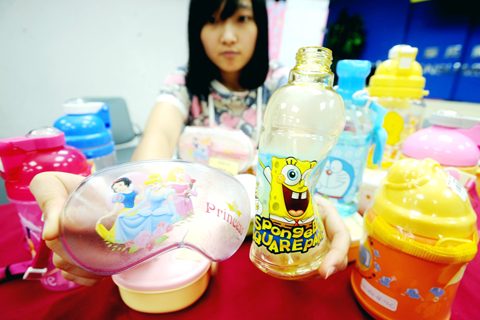With the school season about to start, families should be careful when purchasing plastic lunch boxes and water bottles for their children after a recent survey showed several failed heat tests, the Consumers’ Foundation said yesterday.
The consumer rights watchdog said three of the 18 items it tested became distorted after being subjected to high temperatures.
In May the foundation purchased 10 types of plastic lunch boxes and eight types of plastic water bottles from retail chains, department stores and furniture stores nationwide. Of the tested samples, one type of lunch box and two types of water bottles that claimed to be heat-resistant did not pass standards tests.

PHOTO: LIN CHENG-KUNG, TAIPEI TIMES
DISTORTED
A lunch box labeled as safe for use at temperatures from minus 20ºC to 120ºC became distorted at temperatures within the indicated safe range, foundation chairman Hsieh Tien-jen (謝天仁) said.
The two types of water bottles softened after inspectors poured boiling water into them and allowed the water to sit for 10 minutes.
The foundation said it was unacceptable for products claiming to be heat resistant to change shape or soften despite being used in accordance with instructions labels.
It remained to be determined whether the affected products were harmful to consumers.
“Though we are still awaiting lab results on whether chemicals were released [when the products became distorted], the fact that the products changed shape means they failed the test,” Hsieh said.
Nine of the 18 products tested also failed to provide information on the temperature range they could be used in or did not have instructions in Chinese.
REMOVED
The foundation said it had reported its findings to the Department of Health and urged it to order the products be taken off the shelves.
The group also advised parents not to put steaming-hot food into plastic lunch boxes and to limit the use of microwaves to heat lunch boxes since it could lead to the release of harmful chemicals.

Taiwanese can file complaints with the Tourism Administration to report travel agencies if their activities caused termination of a person’s citizenship, Mainland Affairs Council Minister Chiu Chui-cheng (邱垂正) said yesterday, after a podcaster highlighted a case in which a person’s citizenship was canceled for receiving a single-use Chinese passport to enter Russia. The council is aware of incidents in which people who signed up through Chinese travel agencies for tours of Russia were told they could obtain Russian visas and fast-track border clearance, Chiu told reporters on the sidelines of an event in Taipei. However, the travel agencies actually applied

New measures aimed at making Taiwan more attractive to foreign professionals came into effect this month, the National Development Council said yesterday. Among the changes, international students at Taiwanese universities would be able to work in Taiwan without a work permit in the two years after they graduate, explainer materials provided by the council said. In addition, foreign nationals who graduated from one of the world’s top 200 universities within the past five years can also apply for a two-year open work permit. Previously, those graduates would have needed to apply for a work permit using point-based criteria or have a Taiwanese company

The Shilin District Prosecutors’ Office yesterday indicted two Taiwanese and issued a wanted notice for Pete Liu (劉作虎), founder of Shenzhen-based smartphone manufacturer OnePlus Technology Co (萬普拉斯科技), for allegedly contravening the Act Governing Relations Between the People of the Taiwan Area and the Mainland Area (臺灣地區與大陸地區人民關係條例) by poaching 70 engineers in Taiwan. Liu allegedly traveled to Taiwan at the end of 2014 and met with a Taiwanese man surnamed Lin (林) to discuss establishing a mobile software research and development (R&D) team in Taiwan, prosecutors said. Without approval from the government, Lin, following Liu’s instructions, recruited more than 70 software

Taiwanese singer Jay Chou (周杰倫) plans to take to the courts of the Australian Open for the first time as a competitor in the high-stakes 1 Point Slam. The Australian Open yesterday afternoon announced the news on its official Instagram account, welcoming Chou — who celebrates his 47th birthday on Sunday — to the star-studded lineup of the tournament’s signature warm-up event. “From being the King of Mandarin Pop filling stadiums with his music to being Kato from The Green Hornet and now shifting focus to being a dedicated tennis player — welcome @jaychou to the 1 Point Slam and #AusOpen,” the